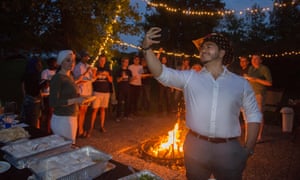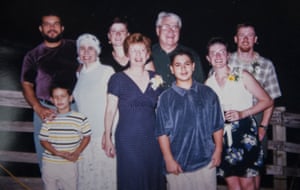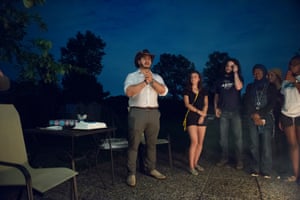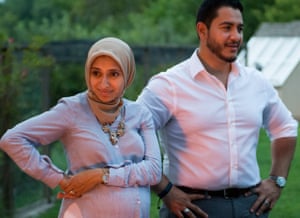'The new Obama': will Abdul El-Sayed be America's first Muslim governor? | US news

At seven years old, Abdul El-Sayed sat in the eye of Hurricane Andrew, the most destructive hurricane in US history until Katrina. Living near Miami, El-Sayed drank juice while swaddled under mattresses between his father and stepmother, who was holding El-Sayed’s newborn baby brother just home from the hospital.
The 1992 storm had taken an unexpected turn southward, and the El-Sayeds could not be evacuated. The wind made an awful rattling sound on the screens.
The front door blew in. The wind and the rain whipped into the house, “as if the ocean was coming at you”.
El-Sayed’s father, Mohamed, crawled on his stomach to shut the door, the rain whipping his face, the wind beating his body. The eye of the storm passed directly over them and the National Guard eventually evacuated them.
At the moment, American politics feels a bit like being in the eye a hurricane. Donald Trump has stated America’s nuclear arsenal is “locked and loaded”, should North Korea make any false moves and neo-Nazis are openly parading in the streets bearing torches, resulting in a young woman, Heather Heyer, being murdered in Charlottesville, Virginia.
No one man can stop the hurricane. But in Michigan, a grown-up El-Sayed is now having a go, trying to keep the storm at bay in a state that is having some of the hardest times in the union. He’s still a year out from the primary, but in his attempt at running for governor of the state, he is trying not just to win, but also to change American politics itself.
If El-Sayed wins, he will be the first Muslim governor in US history.
 Abdul El-Sayed goes live on Facebook during a campaign cookout. Photograph: Sean Work for the Guardian
Abdul El-Sayed goes live on Facebook during a campaign cookout. Photograph: Sean Work for the Guardian When driving from Detroit to Adrian, Michigan, my hometown, you pass by a mosque near Ypsilanti that was burned to the ground in an arson last March. Adrian is 45 minutes from any freeway, the county is rural, and the cornfields rolling. You pass by a number of road signs offering jobs – $28 dollars an hour for skilled work, less for driving a truck.
The city itself, the largest town in the county, holds only about 20,000 people. It is the kind of place with lots and lots of American flags. It’s also Trump country, white and Christian, the county voting with the president 57% to Hillary Clinton’s 36%.
El-Sayed was speaking there on a recent Sunday afternoon in a public hall. A young local transgender man introduced El-Sayed to the audience – a brave choice for a region still coming to terms with gay rights, let alone trans rights. Just a few miles away in Jackson, Michigan, the house of two organizers for the town’s first ever pride parade was burned in what investigators are calling a possible arson.
El-Sayed’s stump speech revolves around fleshing out his personal story. He’s the son of an Egyptian immigrant who remarried to a now converted white, rural Protestant mother. His uncles learned to prepare venison Halal so his entire family could share in the meals. Throw in an atheist language professor uncle from the former Soviet Union, and Thanksgiving dinners were interesting to say the least.
At this stage in his speech, El-Sayed usually pivots to speaking about the US constitution and the soaring rhetoric of hope and commonality.
Freedoms in this country have everything to do with that separation of church and state
Abdul El-Sayed
“As you can imagine, these people come from fundamentally different walks of life, they have known different realities. But, they see a common future. And that’s because it’s a common future they have built together,” he said. “I learned about a society that was founded on an ideal that my father invested in back in 1978 when he came here, one that told him, ‘We hold these truths to be self-evident, that all people are created equal.’”
One of the first questions El-Sayed gets asked that day is about Sharia law, asking about his thoughts on the custom, by a clearly agitated man in a checked button-down shirt.
The rumors surrounding El-Sayed’s faith are small but persistent, spread by a handful of far-right websites preying on the uninformed and fearful.
One morning, I asked him about them over breakfast.
“Are you the spear tip of a vast Muslim conspiracy to bring Sharia law to the US?”
“No,” he said.
“Are you a front for the Muslim brotherhood to pervert American politics towards terrorism?”
“No.”
“Were you handpicked by George Soros to lead a vast liberal takeover of the government?”
“No. I’ve never met George Soros.”
It’s tempting to make any story about El-Sayed about his faith, and how it is central to how voters perceive him. He answers questions about his faith like all the others about more mundane matters like tax policy or infrastructure development: head on, with razor-sharp intellect and rhetoric.
But to reduce him to his faith would also be a disservice. His story is one of responsibility, courage and hope.
 Adbul El-Sayed as a child and his family. Photograph: Sean Work for the Guardian
Adbul El-Sayed as a child and his family. Photograph: Sean Work for the Guardian “I believe in a separation of church and state,” he started, making a note that John F Kennedy’s Catholicism was also a turning point in American politics.
“I can tell you that my ability to practice my faith in person, in my own home, when I choose to, where I’m allowed to, because of freedoms in this country have everything to do with that separation of church and state,” he said. “If I am going to want to be able to put my face on the ground 34 times a day, like I do, because I’m Muslim, I want to make sure no one can take that right away from me. And I will not take that right away from anyone else.”
He received an enormous round of applause after answering the question – in a nearly completely white and Christian room – and a standing ovation at the end of the event, that went over time by almost an hour.
Afterward, I asked the man who asked the Sharia question if, after hearing El-Sayed speak, he thought he would bring Sharia law to the US.
“No,” the man said. “I don’t.”
El-Sayed’s résumé and progressive bonafides are nearly impeccable. He is a Rhodes Scholar, a doctor, formerly a professor at an Ivy League university (where he wrote the textbook for his class) and is the former director for the health department in Detroit, the youngest in any major city. He’s only 32 years old, and would be the youngest governor since Bill Clinton in 1978. He will also become a father for the first time in less than three months.
He has pledged to take no corporate Pac money and is unabashedly disdainful of big money influencing elections, calling corporate campaign contributions “bribes”. He has pledged universal healthcare to all Michiganders if it fails on the federal level, says he will push to legalize marijuana and says he will raise the minimum wage to $15 an hour and make Michigan a “sanctuary state”: as a spokesman puts it, he is “unwilling to waste state taxpayer money to enforce federal lawthat would rob small businesses of hardworking employees and tear apart families”.
And he has a real chance of winning. A year ahead of the Democratic primary, he has raised more than $1m, Bernie Sanders style, through individual donations – despite little name recognition or support from the “establishment” Democratic party in the state. His campaign is lithe and muscular, knocking on tens of thousands of doors already.
Maybe most importantly, El-Sayed has a rhetorical style and charisma that draws easy comparisons to a young Barack Obama, his events often inexplicably packed. At a campaign event in Ann Arbor one woman, Tamanika Terry Seward, said: “I think the last time I sat there and gave that kind of smirk is when I first heard Obama in Chicago, when he was running for senator.”
Michigan is ready for change. Flint’s water was just poisoned by the state government in what is likely the largest environmental disaster of the 21st century so far. And according to a study from the Center for Michigan, public trust in state government has never been lower, with staggering numbers like 80% of people mistrusting the government in areas like education.
El-Sayed’s personality, policies and campaign apparatus are clearly large enough to overcome Islamophobia in the state – a decade ago, who would have thought the president of the US would have been black and bear the middle name of Hussein, and the mayor of Detroit, the blackest city in the nation, would be white?
The question becomes: can he overcome the cynicism and distain for current politics tearing the US apart?
El-Sayed’s campaign staff is young, fun and smart. Political stickers slapped on laptops are ubiquitous, staffers hail from Harvard and other elite institutions, and the campaign on the whole seems incredibly diverse and well run.
After chatting for a few moments with campaign interns, I ran into two of them in the bathroom. One, a Muslim, was washing his feet in the sink before praying. Another, pierced and dyed and queer, washed his hands in the sink directly next.
The campaign, reflected in his staff, is a reflection of a different America to the one hailed by the “alt-right” – pluralistic and diverse .
 Abdul El-Sayed of Detroit talks to campaign volunteers during a cookout in Ann Arbor, Mich. Photograph: Sean Work for the Guardian
Abdul El-Sayed of Detroit talks to campaign volunteers during a cookout in Ann Arbor, Mich. Photograph: Sean Work for the Guardian El-Sayed himself reflects this, bouncing between subjects in casual conversations in a campaign vehicle en route to speak to voters at polling places for a primary election in Detroit. We talk about the percentage of C-sections and Shakespeare, and he makes uproarious jokes likely never to be seen in public like faux campaign slogans (“the Egyptian Prescription”).
But El-Sayed can also be deadly serious and ferociously passionate about America’s political reality, speaking with barbs in a way nearly unheard of from the mouths of politicians who hedge and weasel.
“I’m trying to remind people why the system is built the way it is, and that it has been corrupted by a very small, very powerful, very rich group of people, who have fundamentally bought out our politicians,” he said. “I don’t think our forefathers were imagining huge corporate behemoths that were not aligned to anything but a quarterly bottom line of some amorphous group of stockholders, who would then be ruled as having the rights of people, and then be able to either, up front of behind closed doors, buy out our politicians to create a system of politics that was not beholden to anything but corporate bottom lines.”
The turnout in Detroit’s primary election that day was just over 10%, heavily favoring the incumbent mayoral candidate awash in big money. I asked El-Sayed if he would rather win with corporate money or lose without it. He replied the latter.
Many of his staffers are veterans of the Sanders campaign, and his funding structure is remarkably similar. He’s also running on his conscience, not trying to “reverse engineer” a candidate with polls testing opinions or policies.
Where Sanders failed, though – he never broke from a laser focus on economics or really addressed inequalities brought by race and gender – El-Sayed embraces those challenges, represents them even.
“The electorate [in Michigan] doesn’t know what it wants, but it wants something different,” his campaign manager, Max Glass, said. “I wouldn’t have taken this race if I didn’t think we could win.”
The other, less comfortable, comparison is to Trump. El-Sayed is an outsider candidate who speaks his mind, with no elected political experience aside from his appointment as health director of Detroit. In many ways, he’s the other side of the same coin, a populist candidate in a populist time.
A fan of hip-hop, El-Sayed played a song late one night coming home from a campaign event. In vulgar terms, the song, America by Logic, decries racism, anti-immigrant sentiment, police brutality and other modern ills, a sort of 21st-century Mississippi Goddamn.
“This is the best line in the song,” he said turning the music up ever so slightly.
“Don’t run from Trump,” it went. “Run against him.”
Running against Trump – a president who touted a “Muslim travel ban” as one of his policies – poses its logistical challenges.
The location of the campaign office is a guarded secret, and many staffers have had to speak with their families about potential danger before starting their jobs.
Since April 2013, there have been 370 hate incidents directed at US mosques and Muslim community centers. In 2015 alone, there were 257 anti-Muslim hate crimes in the US, according to the FBI. And in Michigan, the village president of Kalkaska, a small town in the north, has called for the death of Muslims, “all, every last one”. He still sits in office.
As much of El-Sayed’s public persona and story revolves around his multicultural family, I went to visit some of them including his step-grandparents, whom he lived with during college at the University of Michigan; his parents, and his wife. I asked them if they were worried about the candidate’s safety.
 Abdul El-Sayed and his wife, Sarah Jukaku, at a cookout in Ann Arbor. Photograph: Sean Work for the Guardian
Abdul El-Sayed and his wife, Sarah Jukaku, at a cookout in Ann Arbor. Photograph: Sean Work for the Guardian His father, a high-ranking auto engineer who worked on the first automobile optimized using computers, spoke to me in a coffee house in Dearborn, a city often said to be the center of Arab America. An occasional imam, he twisted a straw wrapper in his fingers, nervous, and seemed both unused to speaking with the press yet holding a sense of duty to do so.
“Are we scared about him? If he goes out and fights injustice, even if he gives his life for that, as long as he’s trying to do the right thing and fight injustice and bring justice to somebody’s life – we’re all going to die one day,” he said, his voice becoming solemn, almost sad. “To die for a cause is better than to die in your bed.”
His step-grandparents, who are white, shared the same fears yet the same determination. Their house was decorated with a shower curtain printed with a map of the world and a needlepoint Christian manger scene below large family photographs of women wearing hijabs.
His stepmother remarked the family wasn’t focusing much on the danger, but rather looking toward the possibility.
“He won’t do it alone, but he can change politics,” his stepmother said. “I think he’s already doing it. He goes up north and sits down with people that look like his grandpa, and they don’t know that. But then they have this conversation, and this is the first Muslim person they’ve ever met.
“People are seeing someone for the first time, they’re not seeing a cartoon, they’re seeing a real person.”
One woman said, after hearing El-Sayed speak at a Democratic event in Oakland County: “You just won my heart. All you have to do is drive around and talk like you did today, and you will win this state.”
At a candidate forum in Flint, where the water is still not drinkable according to many residents, El-Sayed seemed to make a big splash. Although some were still concerned about his electability, nearly every single person I spoke with said they would vote for El-Sayed if the primary was held the next day.
“I’m running for the future of my child,” El-Sayed said to me on multiple occasions during the week I spent with him. That proposition is becoming more immediate every day: his wife is six months along.
“I think making a bold statement, when a lot of people feel like you should be afraid ... can be inspiring,” said his wife, Sara. “I think it’s easy and comfortable to sit on the sidelines, to worry or to completely just turn off what’s going on in the world. If you can make a difference, I do think it’s a responsibility.”
It’s also reflected in the way El-Sayed speaks, rapidly and with confidence, as if he’s trying to bowl the listener over with facts and stories and pathos, as if he’s trying to get all the information in before some great catastrophic change to our semi-peaceful way of life squashes his opportunity, his child’s and ours.
He’s a man who believes politics can be changed, repaired even. His is a story at least as old as the United States, about a person who believes what we were taught in grade school: that all people are created equal, that change can come, that we can live up to our ideals.
“No matter the outcome,” said El-Sayed, “we will have won if we can change politics.”
Komentar
Posting Komentar